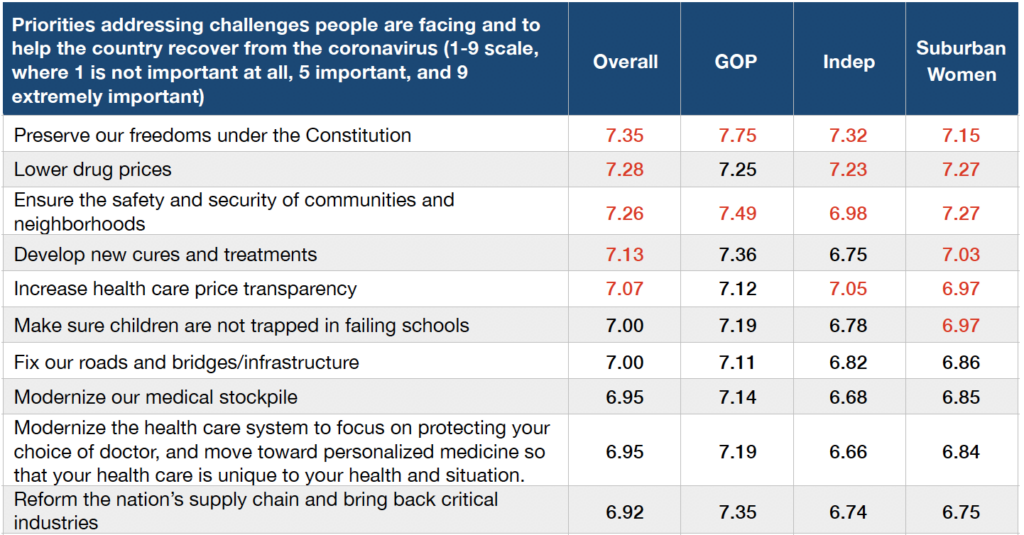In our first blog post on The Winston Group’s research, we looked at how Americans’ perceptions of the coronavirus are shaping their long-term outlook of the country. There are opportunities for important reforms in areas like education and health care, especially as it concerns technology, but the idea of “social engineering” is off-putting for a lot of people. There is also a very strong desire to get the country moving again on the right track economically, but people are still wary and want to see social distancing and masks strongly encouraged.
While COVID-19 is a daily concern in our lives, there are other important issues. To put it another way, we don’t stop thinking about our veterans, the quality of education, and ensuring the safety of our neighborhoods just because we remain concerned about the virus.
People are looking for specific plans and outcomes – not rhetoric. In fact, any kind of political rhetoric is turning people off more than usual. Except for the ideological extremes, the survey showed that overwhelmingly, the platitudes and bumper-sticker slogans that permeate during election cycles are anathema to people this year.
Social Security and retirement remain a top issue for people. The economic lockdowns brought into stark relief the lack of savings, especially among lower-income families. Here’s how Yahoo! Money described it:
After weathering the early stages of the recession, poorer Americans are now losing what financial security they had, with the most difficult months yet to come, according to a non-profit that works with lower earners.
“Things are looking very frightening for working families in the U.S. right now,” said Leigh Phillips, the president and CEO of SaverLife, during an interview on Yahoo Finance on Wednesday. “Over the last few months, we have seen savings balances steadily declining and deposits into savings steadily declining.”
So it’s not surprising that the idea of retirement security came in third among top issues after the economy and jobs, and health care. Fears about terrorism and national defense, while still prominent, have slipped to the bottom of the Top Issues list, but it remains to be seen what impact the recent peace agreements between Israel, the United Arab Emirates, and Bahrain will have as countries in the Middle East coalesce around shared concerns of a nuclear Iran. People do want to see strengthened cybersecurity, especially as it relates to preventing foreign nations from stealing our intellectual property. It is a maxim in American politics that when things are going fairly well overseas,(which we usually define by a lack of war, that the average person pays little attention to foreign affairs.
As we delve deeper into the other issues, we see that people who describe themselves as Independents prioritize preserving the freedoms enumerated in the Constitution while also being concerned about lower drug prices and increasing transparency around healthcare costs. In particular, people want to know before an appointment what they are going to be charged.
Independent voters keyed in on reforming the Federal bureaucracy, and it’s been interesting to watch regulations being lifted to speed up procurement, research and development, and other activities designed to get more and faster coronavirus test kits as well as vaccine development and, earlier this year, ventilator manufacturing. Americans for Tax Reform has a running list of more than 800 regulations that have been waived this year alone to fight coronavirus. For Independents and many others, this raises the question: Were these regulations necessary?
People want to know how their elected officials are going to solve our problems. Some of the ideas that people responded well to have been around for a while, but in this Age of Corona, they have taken on greater importance. This includes:
- Giving parents more choices for educating their children;
- Supporting startup formation and access to capital for small business and entrepreneurs;
- Requiring colleges to “have skin in the game” with accountability on student outcomes and cost;
- Halting federal funds to universities that stifle free speech;
- And offering pre-K for all 3- and 4-year olds.
Making sure children aren’t trapped in failing schools has become much more widespread as so much of the fall curriculum has switched to online platforms and portals. While many private and religious-based schools seem to have figured out safe, in-person instruction, public school districts are lagging behind. Other priorities include:
